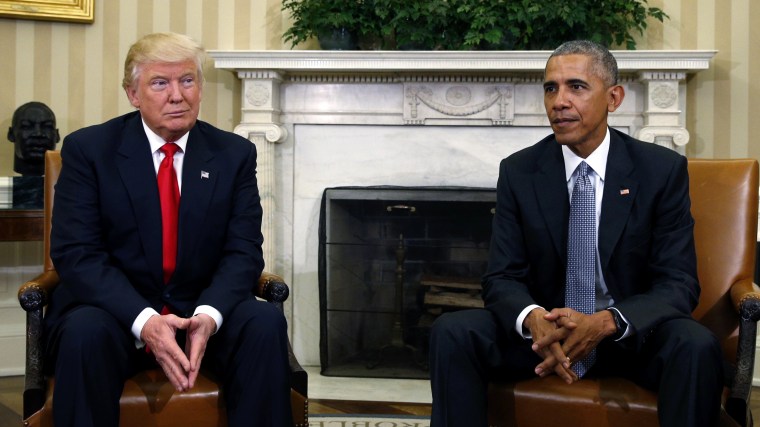BuzzFeed published an interesting piece yesterday based on interviews with "six top European government officials who've had firsthand dealings on the international stage with [Donald Trump] and his administration." Not surprisingly, the foreign officials characterized the American president as erratic, ignorant, and "something of a laughing stock among Europeans at international gatherings."
But what stood out for me was the description of Trump's obsession with his predecessor. "It's his only real position," one European diplomat said. "He will ask: 'Did Obama approve this?' And if the answer is affirmative, he will say: 'We don't.' He won't even want to listen to the arguments or have a debate. He is obsessed with Obama."
And while that's plainly pathetic, it's consistent with everything we've seen from this president -- who seems to think about Barack Obama far more than he should, accusing him of all sorts of weird things, including secretly tapping his phones. Just this morning, Trump highlighted an unscientific poll of sympathetic Twitter users who said they like him better than his predecessor, which the Republican apparently considered important for reasons he didn't explain.
In fact, the burgeoning crisis in North Korea seems to have brought these festering attitudes to the fore. The Washington Post reported this morning, "Starting on Wednesday night, the Republican president retweeted a series of Twitter posts related to his Democratic predecessor, starting with one by John Bolton, a former U.S. ambassador to the United Nations and Fox News contributor, who said the United States is at risk because of Obama."
The problem -- well, one of them, anyway -- is that aside from the reckless rhetoric, Trump's policy towards North Korea is surprisingly similar to Obama's.
Despite all kinds of recent West Wing whining that Obama should be blamed for the North Korean threats, Slate's Joshua Keating explained yesterday that the current president's foreign policy, such as it is, seems pretty familiar.
The main approach of the last four years of the Obama administration was to push for more international sanctions, covertly sabotage North Korea’s missiles, provide defense systems to North Korea’s neighbors, and call on China’s leaders to do more to pressure Kim.Is this starting to sound familiar? A number of observers have pointed out that there’s more continuity between the Trump and Obama approaches than you might think. This makes sense given that avoiding direct confrontation with North Korea is probably the only option for avoiding a body count in the tens of thousands if not more. And despite the rhetorical fire and fury unleashed by the president Tuesday, more level-headed officials like Tillerson are indicating that the U.S. policy on North Korea hasn’t changed.
Obviously, Trump's apocalyptic rhetoric is fundamentally at odds with his predecessor's diplomatic approach -- Obama knew better than to casually threaten a nuclear confrontation without forethought as part of an ill-tempered tantrum -- but if we look past what Trump is saying and focus entirely on what his administration is doing, this White House has discovered that the previous White House actually knew what it was talking about.
It's why, the amateur president's bluster notwithstanding, the Trump administration is effectively reading from Obama's script on both North Korea and ISIS.
As the Washington Post's Dana Milbank wrote last week, "President Trump appears to have found himself a new national security adviser. His name is Barack Obama."
